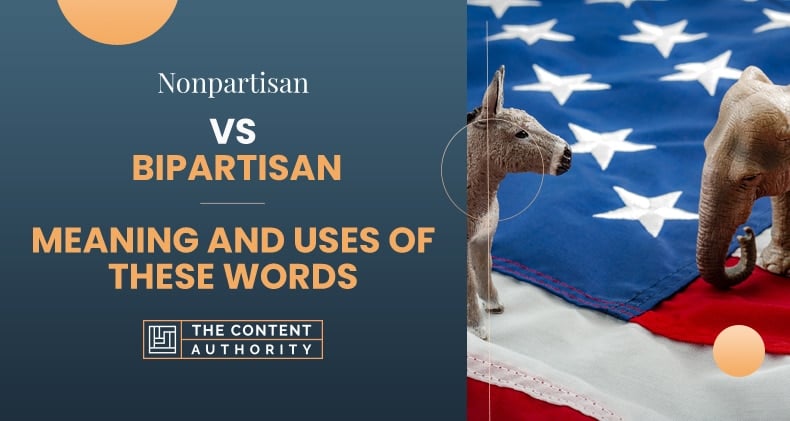Political language can be overwhelming, and it can be hard to understand some terminologies. Bipartisan and nonpartisan are commonly used in a political context, but people tend to confuse them because they can describe similar situations. But how do we define nonpartisan or bipartisan posture in plain language?
The term nonpartisan describes a neutral point of view relying on an objective position to reach general welfare. Bipartisan relates to a nonpartisan way of solving social crises of two opposite parties finding consensus over opposing decision-making.
To understand the meaning of nonpartisan and bipartisan, let us break down these terms and examine their root word partisan. We will show some examples and uses in a political context.

What Is The Meaning Of Partisan?
We use partisan to describe a prejudiced idea that is in favor of a particular cause. Usually, people with partisan tendencies defend partial concepts and principles. They don’t consider any other point of view and show blind adherence to a particular cause or idea. For example:
- Conservatives are making changes to the Penal Code from a partisan standpoint.
- Donald Trump was a violent partisan leader with solid conservative principles.
- Partisan media can polarize viewers’ ideas.
- The country has a very partisan environment around new reforms to the Penal Code.
- Partisan ideologies have prejudiced the government against abortion decriminalization.
- Partisan beliefs against black people blinded them.
- People adopt partisan postures because of their need for belonging.
- He dislikes the partisan aspects of political campaigning.
Etymology Of Partisan
Partisan originates from French partisan and Italian partigiano, which means “defender of a party.” It dates from the 16th century.
Synonyms And Related Terms
The following terms denote a negative preconceived opinion towards someone or something. Therefore, they are related to what partisanship entails.
- Biased
- One-sided
- Parti Pris
- Partial
- Prejudiced
- Unfair
- Discriminatory
Antonyms
In the opposite sense, we can associate the following words with describing a decision that includes all the parties in a discussion.
- Disinterested
- Equal
- Equitable
- Evenhanded
- Fair
- Impartial
- Neutral
- Objective
- Unbiased
- Unprejudiced
- Nonpartisan
What Does Nonpartisan mean?
The nonpartisan concept describes a non-biased or partisan standpoint towards any particular political group or idea. People with nonpartisan principles don’t choose any particular perspective when deciding on a common good. It is used to refer to an unprejudiced citizen mobilization that considers different opinions to reach a common goal. In other words, these groups or individuals rely on objective facts and do not promote any particular ideology.
Within politics, it represents a person or entity’s decision-making that is not affiliated with a specific political party. However, we cannot consider nonpartisan terms apolitical because although they don’t support one political affiliation over another, they work in a political manner. For example:
- Judges should make decisions in a nonpartisan way, and they should not represent any political party. They should rely on facts, not be loyal to any particular side.
Other examples:
- The organization I belong to is a nonpartisan pro-democratic entity.
- Newspapers should inform their audience in a nonpartisan manner.
- Nonpartisan groups don’t have an affiliation with any particular political party.
- A nonpartisan posture allows people to reach a common good.
- Nonpartisan political organizations do not agree with current partisan parties.
- My nonpartisan ideas may conflict with conservative people.
- The American Legislative Exchange Council and the Center for American Progress describe themselves as nonpartisan organizations; however, they show political ideologies.
- President Dwight Eisenhower was nonpartisan until 1952 when he joined the Republican Party and was elected president.
- In Canada, the Legislative Assembly of the Northwest Territories and the Legislative Assembly of Nunavut are currently nonpartisan, and they operate on a consensus government system.
- In 2009, Anal Saha initiated a nonpartisan campaign in India to encourage citizens to vote in general elections.
- In the Philippines, candidates for positions are nonpartisan because they are not affiliated with any political party.
- Non-profit organizations are required to remain nonpartisan to maintain tax-exempt status.
- An Independent, nonpartisan politician is a politician who doesn’t belong to any political party. However, in most countries, they cannot run for any position without the representation of a political party.
Etymology Of Nonpartisan
The term nonpartisan arose in 1872 in American English. It is a combination of non- + partisan “pertaining to a (political) party.”
Synonyms And Related Terms
Within a decision-making context, we can relate nonpartisans with the following terms. These expressions denote that a person or group does not favor any opposing parties in a conflict.
- Impartial
- Unbiased
- Unprejudiced
- Objective
- Dispassionate
- Fair
- Equitable
- Just
- Neutral
- Disinterested
For example:
- Fighting against corruption is a situation that requires an objective partisan posture towards any particular political group. In this sense, we can also use the term bipartisan to define a nonpartisan deal between two political parties with different interests.
Definition Of Bipartisan
According to the Oxford Languages dictionary, bipartisan means “involving the agreement or cooperation of two political parties that usually oppose each other’s policies.”
We can say that bipartisan is when two groups with opposite beliefs agree when making decisions on a policy. It refers to a situation where two opposing groups work together to find a consensus and solve an urgent social crisis.
- The two main political parties should take a bipartisan approach when considering human rights issues.
- Covid-19 has produced agreements between opposite parties, creating a bipartisan system to deal with issues that arose due to the pandemic.
- France established a bipartisan political system in 1975 between liberal and conservative parties.
- The United States needs bipartisan support to establish a disarmament law.
- A bipartisan bill was introduced to handle the situation on the Haitian-Dominican border.
- Senators are discussing a bipartisan infrastructure bill.
- President Joe Biden has bipartisan support for passing his bill.
- Both political parties hope they could reach a bipartisan agreement after taking office.
- The LGBTQ+ community hopes they received bipartisan support on their human rights demands.
More Great Word Vs Word Posts
Etymology Of Bipartisan
The word bipartisan is a combination of the prefix bi- which means “two” and partisan. The term partisan originated from the Middle French and North Italian dialect through the Latin part- or pars, and means “part.” The first known use of this word was in the 16th century in 1891.
Related Terms
- Bilateral
- Cross-party
- Bipartite
- Dual-party
- Bicameral
- Coalition
Example Of Bipartisan System
A bipartisan system rules the United States. Republicans, the conservative party, and Democrats, which are the liberal parties, are the main parties in charge of the resolutions and other political actions within this territory. We can understand bipartisan when Democrats and Republicans agree or find a balance between their opposing ideas to figure out a social dilemma. For example, President Obama was criticized by the Republican party because he failed to follow their principles when he got elected. Obama explained that he genuinely reached out to the Republicans to discuss public plans to be open to each other’s ideas. He argued that bipartisanship is not by any chance a renunciation of your principles and ideals but a point of balance between contrasting ideas to solve a social dilemma.
To Summarize
Human beings are naturally social beings, and as such, they need each other to function in daily life properly. However, we all have different ideas about how a society should work. It can be challenging to agree on the proper way to manage social concerns due to people having contrasting views and postures about life. Terms like nonpartisan and bipartisan are used in a political context.
We can use them to describe a situation where there are different points of view when we try to reach an agreement. However, nonpartisan can be a broader word that considers multiple ideas, while bipartisan implies two opposing beliefs that come together.
Shawn Manaher is the founder and CEO of The Content Authority. He’s one part content manager, one part writing ninja organizer, and two parts leader of top content creators. You don’t even want to know what he calls pancakes.


